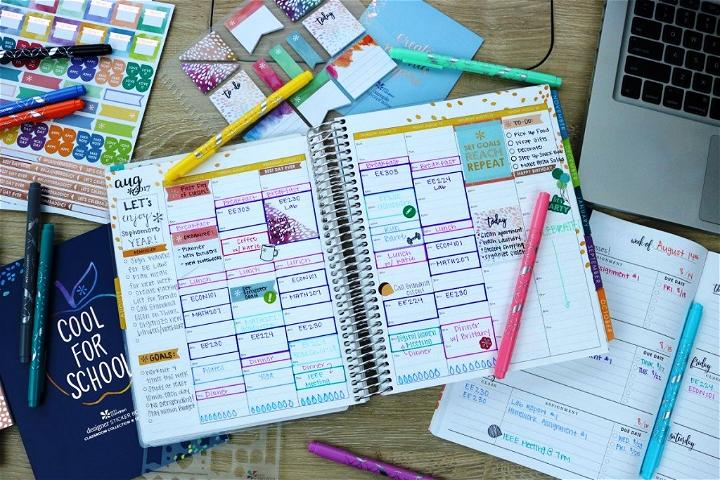I would have loved it if someone had taught me how a good student should be organized when I started college or high school. The professors would try, but they would stick to theory, and no one would teach a student how to really get organized. I hated it when I was told, “You have to study from the beginning!” and it was true. But how? This should have been a school subject as important as math or language! A subject of organization! I hope that if anyone in charge of a school reads this article, they will put it into practice.

If you are a university student or even a high school student, who is learning to be a paper writer in order to successfully enter university, or if your children are in it, we suggest you implement these 10 recommendations from the beginning of the term to reach the exams and the end of the course with the best results.
1. Define Your Objectives
It is very important to know where you want to get to. And to achieve these goals, it is essential to divide them into small tasks. If you do not divide your goals, you will find it overwhelming to try to get there because each goal alone will probably seem difficult to achieve at first. Example. I aim to pass my accounting exam in 10 weeks with flying colors. To do this, I must not only attend class but also divide the syllabus into small sections, complete the exercises for each section, study the theory for each exercise, look for additional information for each section to complete it, look for specific examples of each section, and many other tasks that may arise. If little by little and every day, I complete small tasks, I will achieve the goal I had set for myself.
2. Always Have An Agenda With You
Whether on paper or digital, it will help you to write down everything you have to do and the tasks you have to finish, and it will help you to plan your daily study. Adding the list of tasks in which you have divided your goals is especially necessary. By writing down everything, you make sure you are super organized and that you don’t forget anything important that you have to finish. I never used a planner in college. It would have been so useful.
3. Keep A Weekly And Monthly Schedule
It is very useful to have written down in one place everything you have to finish that week and that month, so you can see it in its entirety at a glance. It will allow you to plan better. Include the dates for each exam and each project you have to present and calculate backward to know when you should start preparing for it.
Remember also to write down other activities, whether they are recreational because they will keep you away from your studies for a few hours (parties, concerts, theater outings, outings with friends, etc.) or extracurricular (sports, cooking classes, theater rehearsal, yoga …), also the time for transportation, to eat, to get ready, and you will see the real-time you have left to STUDY.
Include the hours you can dedicate daily to study (review, finish homework, advance projects, etc.). If you are a full-time student, you should dedicate at least 40 – 45 hours per week to classes and independent study.

Know yourself well and define what time is when it is easiest for you to concentrate. For example, I have always been a morning person (I still am), and it was much easier for me to study very early in the morning. Still, after 7 or 8 o’clock, I could not study because I would get into a horrible stupor.
Remember that it takes longer to study something than you might think at first. Allow enough time for each task you set as a goal. And if you aim to finish some time before the actual due date, you won’t arrive with your tongue hanging out.
Prioritize according to the importance of each task and according to the date by which you must finish it.
Leave time for fun. This is as important as studying… But only if you have really studied, of course!
4. Keep A Filing System
A system to help you keep all your notes in organized way. If you are more of a paper person, a file folder will allow you to keep all kinds of notes on each subject. If you are more digital and live glued to your laptop use some of the resources like OneNote that you can synchronize on other devices and share with other colleagues. It allows you to create all the folders and files you need for each subject.
5. Keep A List Of Contacts
Emails or phone numbers of fellow students, teachers, library, secretary, etc. so you don’t lose time if you need any information.
6. Use Your Cell Phone Recorder
This did not exist in our times … the cell phone! Give it a better use than you usually give it and instead of spending so much time on social networks, use it to crush concepts that you have to memorize and are difficult. Just the fact of recording them and listening to yourself afterward, I don’t know why it helps a lot to retain what is difficult to retain when reading.
7. If You Get Discouraged
There are many times when you will feel like you don’t want to study at all. It is very understandable. Motivation is something very personal and you must look for it. It does not come all of a sudden. Be very strict with yourself and establish a daily study routine so that when that “demotivation” comes, you will have that routine so internalized that you will advance even if you don’t feel like it. It will be easier to finish your homework. You won’t be so conscious that you “don’t feel like it.” Put on some helpful music, grab your to-do list and start with what is the least difficult for you. This will get your brain active and you’ll start to focus. Then move on to what’s harder. You’ll get into a rhythm.

8. Review Daily
I know that’s what your parents always tell you … but it’s proven! If you review daily what you have done the day or the day before as complete notes, review what is not well understood and go with the questions to the teacher, order the notes, sheets, photocopies that you have been given, etc. in addition to not needing to spend too much time it will cost you much less to prepare for the exams much less!
9. Anticipate What You Are Going To See The Next Day
A few minutes to read what will be discussed in class tomorrow will help you understand it better when you hear it and it will be much easier for you to learn it. It will also allow you to ask at the moment what you don’t understand because you often don’t realize your doubts until you start to review it.
10. Write Down All The Teacher’s Comments
When a teacher corrects you on an exam and comments on the mistakes you have made or what you should improve, how to do a certain type of exercise, or how to answer certain questions, write it down quickly so you don’t forget it. This will help you in the future not to make the same mistakes and to know what the teacher is asking you.
Surely there are more tricks to make a student better organized and get through the course well. These are the main ones and if you follow them in this way you will get to the end of the course without stress. You are on time! The term has just started and you have many months until the end of the course. Plan well and go for it!
Although we give these recommendations for older students, younger students can also start gradually getting used to these routines. But if you want to know some practical tricks for younger students, remember our past articles and other tricks we have published.
